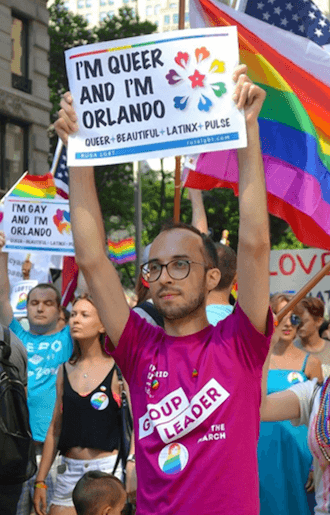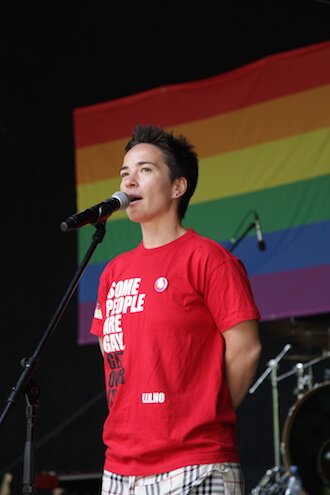Subhi Nahas, a 28-year-old Syrian refugee living in San Francisco, told his story to UN diplomats. | FURKAN HANCIOGLU/ COURTESY: ORAMINTERNATIONAL.ORG
BY PAUL SCHINDLER | In what was a first in international diplomacy, the International Gay and Lesbian Human Rights Commission (IGLHRC) appeared before the United Nations Security Council to discuss what it termed the “careful targeting” of lesbian, gay, bisexual, transgender, and intersex people by ISIS in areas that group controls in Syria and Iraq.
The August 24 meeting, which lasted three hours, was held according to what the UN terms an “Arria-formula,” in which briefings are informal and confidential, allowing for what IGLHRC described as a “frank and private exchange of views.”
Jessica Stern, the group’s executive director, presented evidence of 29 killings of LGBTI people at the hands of ISIS, some of that evidence based on releases from ISIS, the Islamic State in Iraq and Syria, and other information provided by the Syrian Observatory for Human Rights.
International Gay and Lesbian Human Rights Commission leads US-Chile session on “careful targeting” of LGBTI Iraqis, Syrians
As part of her presentation to the Security Council members, Stern displayed a slideshow that opened by stating, “While IGLHRC has made every effort to document every sodomy-related killing that ISIS allegedly carried out during this timeframe, this slideshow should not be considered comprehensive.”
The slideshow included pictures –– some of them gruesome –– of 21 of the victims ISIS has claimed were killed for committing sodomy and related “morality” crimes.
The Security Council meeting was hosted by the United States and Chile, and Stern was joined in her presentation by Samantha Power, the US ambassador to the UN, Cristian Barros Melet, Power’s Chilean counterpart, and Deputy UN Secretary General Jan Eliasson.
Stern opened her remarks by emphasizing that violence and murder aimed at LGBTI people is a part of a far larger assault on human life, but one that is deliberate and calculated.
A picture released by an ISIS unit in Raqqa, Syria showing what the group said was a man executed for “committing the acts of the people of Lot.” | IGLHRC.ORG
“The Security Council has addressed other tragedies created by ISIS,” she said. “Our discussion informs that larger narrative; our concerns are not only for LGBTI people. We condemn in the strongest terms the sexual enslavement of women and girls; ISIS attacks on Christians, Turkmanis, Kurds; and its intent to destroy the Yazidi as a group. There are potential risks and potential benefits to today’s hearing. However, only by working together across the human rights spectrum will we make change.”
In comments after the Security Council meeting, Stern told Gay City News that when her group produced reports on anti-LGBTI violence a year ago in cooperation with two groups on the ground in Iraq, MADRE and the Organization for Women’s Freedom in Iraq, “People said, ‘Interesting, but why would people care about LGBTI victims when everyone is under assault by ISIS?’”
While emphasizing, “We’re not saying we care only about LGBTI victims,” Stern argued that ISIS’ violence is not indiscriminate, but rather informed by “careful targeting,” which is based, in part, on existing biases in Syrian and Iraqi society. IGLHRC, she said, “has been working in Iraq for years, probably first substantively in 2007.”
Stern told the Security Council, “LGBTI Iraqis and Syrians were persecuted long before the emergence of ISIS.” Explaining that her group documented the 2009 killings of men perceived to be gay and the anti-emo campaigns against gender-nonconforming people in 2012, she said, “Murder is only the most extreme form of violence. LGBTI Iraqis and Syrians have been persecuted by intolerance permeating all aspects of life. It was not only the State that abdicated responsibility: some families would rather harm their own children than see their so-called ‘honor’ besmirched. Some have twisted faith to incite violence.”
An ISIS unit in Fallujah, Iraq, released this photo showing the alleged execution of four men on sodomy charges. | IGLHRC.ORG
In her remarks, Ambassador Power echoed several key points made by Stern, describing ISIS attacks on LGBTI people as “systematic abuse” that has “received scant international attention.” ISIL, she said, using the Obama administration’s preferred term, “does not try to hide its crimes against LGBT persons –– it broadcasts them for all the world to see. Many of us have seen the videos. ISIL parading a man through the streets and beating him –– for being gay. ISIL marching men to the tops of buildings and throwing them to their deaths –– for being gay.”
Power also pointed out that anti-LGBTI violence existed in Iraq and Syria prior to ISIS’ emergence. Discussing the experiences of two men who also appeared before the Security Council –– a Syrian refugee living in San Francisco and an Iraqi who spoke anonymously by phone –– she noted, “Both faced discrimination, threats, and attacks before violent extremist groups seized power in their communities.” She added, “Violence and hatred existed well before the group’s dramatic rise, and that violence and hatred extends far beyond ISIL’s membership. The victim in that grotesque video may have been thrown to his death by ISIL, but he was ultimately killed by stone-throwing individuals who did not belong to the group.”
The Syrian refugee who appeared in New York is 28-year-old Subhi Nahas, who fled his home country roughly two years ago prior to the emergence of ISIS on the world stage. Growing up gay, his life was always difficult in Syria, with his father having once violently attacked him and routinely belittling him. His situation worsened in 2011, when the nation’s civil war prompted the government to step up its harassment of LGBTI Syrians. Later militants from Jabhat Al Nusra, a rival group to ISIS, took over his town and announced in its mosques that it would stamp out “people involved in sodomy.”
Eventually, Nahas fled to Lebanon and then Turkey, where he took a job with Save the Children, doing technical web-related work. In Turkey, he was identified by a former Syrian acquaintance who had since joined ISIS and threatened to kill him. Even when Save the Children transferred him to Istanbul, Nahas felt he remained unsafe, and with the help of his employer and Oram, an organization that advocates for LGBTI refugees fleeing brutal regimes, he undertook the cumbersome process of winning US government approval to come here as a refugee. He completed what can take many years in about 12 months, and arrived in the US in June. Nahas now works for Oram in San Francisco, doing web, translation, and public speaking work.
Another ISIS photograph of the alleged execution of a man on sodomy charges. | IGLHRC.ORG
The anonymous Iraqi who telephoned into the Security Council meeting used the pseudonym Adnan; he fled northern Iraq after being targeted by ISIS for being gay. He is a client of the Iraqi Refugee Assistance Project, which helped arrange his participation in the UN event. Adnan, however, remains concerned about his safety, and Power requested that no audio recording be made of his remarks.
Stern and others at IGLHRC expressed satisfaction with how the Security Council briefing played out. Thirteen of the 15 current members attended, with only Chad and Angola being absent. Stern noted that despite rumors that Russia might also boycott the session, its representative was present and stayed for the entire meeting, though without making any comment. Three other members –– China, Malaysia, and Nigeria –– also declined to speak. The rest of the comments, she said, reflected support for the Security Council taking up the question of ISIS targeting LGBTI Iraqis and Syrians, as did statements made during the final hour by a large number of UN members not currently on the Security Council.
“The overwhelming number of states that offered remarks underscored that LGBTI people are part of the groups that are being targeted by ISIS,” she said. “ They had a very crisp understanding of that.”
Stern was particularly pleased with comments from Jordan, which, she said, a diplomat present advised her were the first favorable words about the LGBTI community from an Arab country at the UN to their knowledge.
It was only five years ago that IGLHRC prevailed in a hard-fought battle to win consultative status at the UN, and there was widespread praise for the historic nature of its appearance before the Security Council this week, including a statement from the White House by a spokesperson for the National Security Council. But not every human rights advocate voiced approval for the August 24 briefing.
Scott Long, who formerly helmed the LGBT desk at Human Rights Watch –– where Stern worked as a researcher during his tenure –– was scathing in a blog post titled, “Why this is a bad idea.” In an analysis focused largely on what he described as the failures and illegitimacy of US policy in the region –– and America’s resulting inability to forge an acceptable resolution –– Long wrote, “Is there a plan, or is everybody just happy to ride the panic? At best, the meeting will be useless. It’ll lead to that indolent repletion where people feel they’ve acted when they’ve actually done nothing. At worst, it’s going to cause more killings.”
Saying that “power” was at the heart of ISIS’ appeal to Islamic recruits, Long concluded, “Does anyone think that, given an easy chance to affirm its law and write its defiance of the Security Council in blood, Da’ish [an acronym for ISIS rendered in Arabic] won’t take it?”
One day after the Security Council meeting, Long posted a follow-up on his blog reporting on nine new ISIS killings on charges of sodomy which he titled “New killings: ISIS answers the UN Security Council.”
IGLHRC's Jessica Stern. | IGLHRC.ORG
Asked about Long’s analysis –– though one day prior to his second post –– Stern declined to respond specifically to his arguments. Overall, however, her comments were responsive to several of his major points.
Stern is under no illusion that the Security Council, the UN, or the US currently has a clear strategy for addressing writ large the humanitarian and military crisis unleashed by ISIS, but she does believe that the tragedies facing vulnerable populations in conflict areas, including the LGBTI community, can be mitigated.
“There are UN agencies that have presence in Iraq and Syria,” she said. “They could function like beacons of hope –– if they had any idea about programming that reaches LGBTI people.”
As Long correctly pointed out in his second post, that work could only be undertaken in areas outside ISIS control, but in such areas, Stern said, “The creativity and courage of LGBTI Iraqis and Syrians and a small number of treasured allies have created underground support networks, safe houses –– even if that means just a mattress. There are people who want to do this work, but it is depressing and they have no money.”
For those LGBTI people who can be protected from ISIS, there is a need, she said, for “social support, psychosocial support, even reparations for those who escape from ISIS.” That, however, requires the commitment of funding from the UN and its member states and the integration of LGBTI cultural competency skills into UN and other relief organizations.
Stern also addressed a factor that Long has often emphasized in his human rights advocacy –– the critical role of leadership from those on the ground. Noting the amount of time IGLHRC has worked on Iraq issues, in particular, she said that when the opportunity to appear before the Security Council first surfaced, “we reached out to people there and in the Iraqi and Syrian diaspora and they said they were eager to have the issue aired.”
In her comments to the Security Council, Stern quoted Mahmoud Hassino, founder of the Syrian LGBTI magazine Mawaleh, as saying of the UN briefing, “They have all the information. It’s time to act.”
She underscored the very same point in boiling down IGLHRC’s most important goal at the Security Council.
“The goal of today’s briefing was not to educate them on the targeting of LGBTI people under ISIS,” Stern told Gay City News. “It was to hold the states’ feet to the fire. They have the power in their national treasuries.”







































